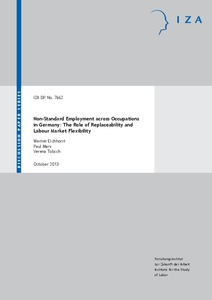Non-standard employment across occupations in Germany: the role of replaceability and labour market flexibility
"The share of non-standard jobs in total employment has increased in Germany over recent decades. Research tends to attribute this in particular to labour market re-forms and socio-economic change. However, it becomes clear upon closer inspection that macro trends alone cannot provide satisfact...
| Main Authors: | , , |
|---|---|
| Institution: | ETUI-European Trade Union Institute |
| Format: | TEXT |
| Language: | English |
| Published: |
Bonn
2013
IZA |
| Subjects: | |
| Online Access: | https://www.labourline.org/KENTIKA-19122459124919406319-Non-standard-employment-across.htm |
| Summary: | "The share of non-standard jobs in total employment has increased in Germany over recent decades. Research tends to attribute this in particular to labour market re-forms and socio-economic change. However, it becomes clear upon closer inspection that macro trends alone cannot provide satisfactory explanations. A striking yet rarely acknowledged aspect of the development in Germany is a large occupational heterogeneity, which is true for both current working conditions and trajectories of change. A process of asymmetric change has been witnessed in recent years, increasing the gap between occupational groups. Given this process, it seems increasingly questionable to aggregate data at the national level. Therefore, this paper analyses the role of different types of non-standard employment across occupations in Germany, explaining variation between occupations with reference to institutional conditions, industrial relations and patterns of labour supply and demand, in particular skill requirements." |
|---|---|
| Physical Description: | 32 p. Digital |

